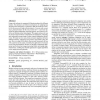Free Online Productivity Tools
i2Speak
i2Symbol
i2OCR
iTex2Img
iWeb2Print
iWeb2Shot
i2Type
iPdf2Split
iPdf2Merge
i2Bopomofo
i2Arabic
i2Style
i2Image
i2PDF
iLatex2Rtf
Sci2ools
108
Voted
GPCE
2007
Springer
2007
Springer
Library composition and adaptation using c++ concepts
Large scale software is composed of libraries produced by different entities. Non-intrusive and efficient mechanisms for adapting data structures from one library to conform to APIs of another are essential for the success of large software projects. Concepts and concept maps, planned features for the next version of C++, have been designed to support adaptation, promising generic, non-intrusive, efficient, and identity preserving adapters. This paper analyses the use of concept maps for library composition and adaptation, comparing and contrasting concept maps to other common adaptation mechanisms. We report on two cases of data structure adaptation between different libraries, indicating best practices and idioms along the way. First, we adapt GUI controls from several frameworks for use with a generic layout engine, extending the application of concepts to run-time polymorphism. Second, we develop a transparent adaptation layer between an image processing library and a graph algori...
Related Content
| Added | 16 Aug 2010 |
| Updated | 16 Aug 2010 |
| Type | Conference |
| Year | 2007 |
| Where | GPCE |
| Authors | Jaakko Järvi, Matthew A. Marcus, Jacob N. Smith |
Comments (0)

